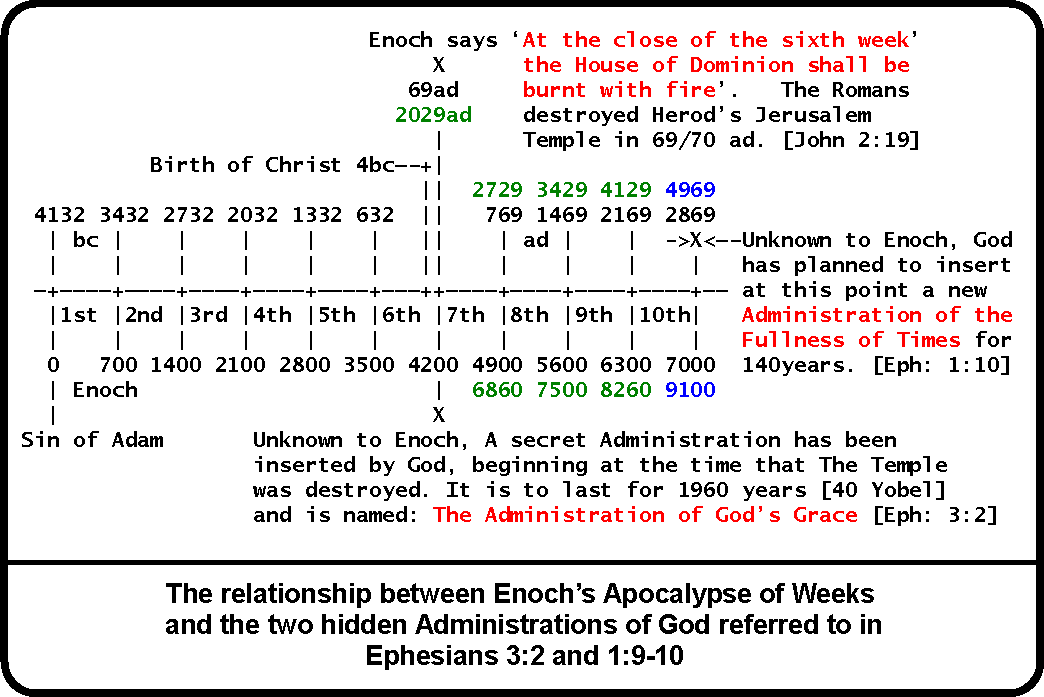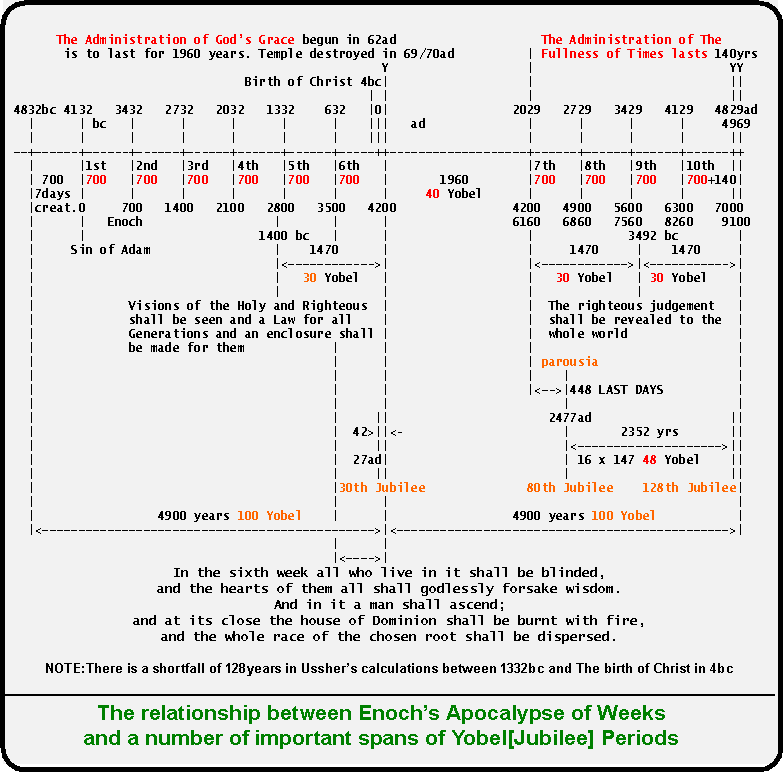
Advancing the Revelation
of Truth
The relationship between Jacob's Life and Enoch's Apocalypse of Weeks
At the time of Christ, The Book of Enoch was included in the Ancient Texts which were regarded as Inspired Scriptures. These came to be known as The Old Testament. Unfortunately the Book of Enoch fell into disrepute during the early Christian Era because of its apparently extreme and therefore misunderstood content. Christians were unable to reconcile this content with, what we know to-day as, the books of The Holy Bible.
In the light of the present Spiritual knowledge of the Christian Scriptures, The Book of Enoch has again begun to be accepted as Inspired by God. Unfortunately, there is no original Hebrew text from which to make translation into English. The best we have is a number of fragments of Etheopic, Greek and Latin texts. The Biblical Greek Scholar, R.H.Charles, has collected, collated and translated these into book form. In the preface to his second edition translation, he writes concerning many improvements that he was able to incorporate:
The translation in the first edition was made from Dillmann's Edition of the Ethiopic text, which was based on five MSS. With a view to this translation, the present editor emended and revised Dillmann's text in accordance with nine hitherto uncollated Ethiopic manuscripts in the British Museum, and the Greek and Latin fragments which had just come to light, but not withstanding every care he felt his work in this respect to be of a wholly provisional character. From the date of the publication of the first edition in 1893 he steadily made preparation for an edition of the Ethiopic text and of the Greek and Latin fragments. This text which is exhaustive of existing textual materials in these languages, was published by the University Press in 1906, and from this text the present translation is made. A new and revolutionary feature in the translation is due to the editor's discovery of a poetical structure of a considerable portion of the work. I call it revolutionary; for such it proves to be in respect of the critical problems of the text. By its means the lost original of the text is not infrequently recovered, phrases and clauses recognised as obvious interpolations, and not a few lines restored to their original context, whose claims to a place in the text were hitherto ignored on the ground of the weakness of their textual attestation.
Because of the increased Spiritual knowledge concerning this book, I make no apology for the use in the following article, of a small section of these Scriptures called The Apocalypse of Weeks. These are ten weeks representing the activities of God and man between the birth of Adam and The Day of God. Each day of these ten weeks is taken to represent a hundred years. Modern theological criticism is unable to interpret the basis upon which these weeks are arranged because they fail to recognise the revelation of this present Administration of God's Grace. This was not revealed until about the year 70ad, having been 'hidden in God' before that time [Eph 3:9]. This Administration of God with all its activities is not therefore included in Enoch's Apocalypse of Weeks because it was not revealed to Enoch. Modern theological critics are unable therefore to discern the True Spiritual nature of this prophesy.
There follows a note concerning the 'Era of the Creation of the World' taken from the secular Encyclopaedia Britannica:
As the Greek and Roman methods of computing time were connected with certain pagan rites and observances which the Christians held in abhorrence, the latter began at an early period to imitate the Jews in reckoning their years from the supposed period of the creation of the world. Various computations were made at different times, from Biblical sources, as to the age of the world; and Des Vignoles, in the preface to his Chronology of Sacred History, asserts that he collected upwards of two hundred different calculations, the shortest of which reckons only 3483 years between the creation of the world and the commencement of the vulgar era, and the longest 6984. The so-called era of the creation of the world is therefore a purely conventional and arbitrary epoch; practically, it means the year 4004 B.C.,—this being the date which, under the sanction of Archbishop Ussher's opinion, won its way, among its hundreds of competitors, into general acceptance.
It must be understood that 4004bc is determined by Bishop Ussher as the year in which Adam brought death upon mankind by disobeying God. It is at this point that the generations of the book of Genesis begin. Up till now, this has been a good guide to enable us to grasp the dates of the events relating to Enoch's Apocalypse of Weeks**.
Enoch's ten weeks of 700years for each week[7000yrs] spans the activities of God and man between the Sin of Adam and The Day of God. The latter ends the Biblical record at the end of the Book of Revelation. The key event connecting the history of the Scripture and the verses of Enoch's Apocalypse of Weeks is the destruction of The Temple in 69/70ad. This event comes at the close of Enoch's sixth week, indicating that six weeks of 700years per week[4200yrs] takes us back to the date of Adam's sin. From the 4200 we must subtract 69 [minus 1...adjustment bc to ad] which gives us 4132 years bc
In the following chart, these years of Enoch's Apocalypse are shown running parallel to the 'Anno Domini'[ad] and 'Before Christ'[bc] dating:

With the addition of the two hidden Administrations, 1960yrs for that of God's Grace and 140yrs for that of The Fullness of Times, we arrive at an end date of 4969ad when The Day of God is introduced. The chart that follows shows these two Administrations as gaps in Enoch's timings. Also shown are The Last Days period split into two parts because of God's postponement of His Kingdom in Israel at 62ad when the apostle Paul quoted from the prophet Isaiah as recorded in Acts 28:28, Spiritually blinding the nation of the Jews.
A further 700years is added at the beginning of the chart to allow for the 7 days of God's reformation and creation of the Earth. It was at the beginning of the eighth day that God discovered Adam's sin which thereby brought death upon all.The length of Enoch's week is the same week length as that of God's reformation and creation......700years.
The total span of time is therefore 9200years which splits exactly into two parts at the time of The Temple's destruction. Each part is 100x[49] of years.

Knowing that Jacob's days are a reflection of The Years of the life of Israel, still leaves many questions unanswered, of which the following are but a few:
-
What is the basis of the timing before the flood? Is that in any way determined in Yobels?
-
What is the basis of the timing after the end of The Last Days, that is after the Second Coming? A distinct number of 48 Yobels.....but why and for what purpose?
-
How will the inclusion of Enoch's Apocalypse of Weeks affect our understanding of God's universal purposes?
-
Does this understanding of Scripture timing increasingly uphold the importance of God's action at the 71st Jubilee in 2036ad?
-
Enoch's Apocalypse of Weeks begins with the sin of Adam and continues for 4128 years to the birth of Christ. Can this be regarded as absolute? If the Apocalypse had begun with the creation of Adam, its origin would be within the sixth creation week, before God rested on the seventh. It would not therefore be possible to determine the exact year. However, if Adam or any other person of his generation had not sinned, there would be no starting point in relation to Christ's unnecessary atoning sacrifice.
The first is based upon the ages of the Patriarchs, giving the time of the Universal Flood in relation to the Apocalypse of Weeks. The second has yet to be defined in any great detail outside that of Enoch's remaining 4 weeks. If, by the study of Enoch's Apocalypse of Weeks, we are allowed resolution, little by little we will learn more.
* This date for the 'beginning' of Adam in 4132bc, is based upon our present calendar and the Old Testament dating of Bishop Ussher. It has been calculated from the statement in the Apocalypse of Weeks which says: 'in the sixth week...a man shall ascend'. This known to refer to the resurrection of The Christ because of its position in the sequence of events.
Of the six days of Creation God said that He saw every thing that He had made, and behold it was very good, SIN had not yet entered, the aionian Life of God prevailed. After Adam Sinned, he came to know Good and Evil [as God's sons already did] and entered the condition of death. It is therefore from this point, that the life span of his 930years is measured. Enoch says that he was born the 7th in the first week, that is the 7th from the first day that Adam sinned.
** Enoch's Apocalypse of Weeks covers a span of time of 7,000 years. The Apocalypse as translated by R.H.Charles erroneously places the Universal Flood during the second week. This is caused by incorrect placing of the lines in two stanzas, numbers 4 and 5. The details of this and their correction are shown here.
If you have comments or queries concerning the statement, please let us know.
Thank you for your information and views - we will respond as soon as possible.